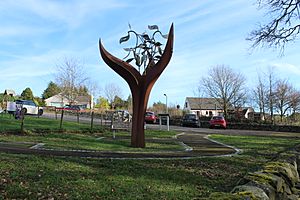Alexander Gordon of Earlston facts for kids
Quick facts for kids Sir Alexander Gordon of Earlston |
|
|---|---|
| Personal details | |
| Born | 1650 |
| Died | 1726 |
| Denomination | Church of Scotland |
Sir Alexander Gordon of Earlston (1650–1726) was an important Scottish gentleman from the 1600s. He was a Covenanter, a group of people who supported a specific type of church in Scotland. He was part of a network called the United Societies. In the early 1680s, he helped organize protests against the King in Scotland.
Contents
Sir Alexander Gordon's Story
Alexander Gordon was the son of William Gordon of Earlston. His brother was Sir William Gordon, 1st Baronet of Earlston.
Escape from Bothwell Bridge
In 1679, Alexander's father was going to join the Covenanters at Bothwell Bridge. Sadly, he was attacked by English soldiers and died. Alexander was fighting with the Covenanters at Bothwell Bridge. He almost got caught! A clever person who lived on his land recognized him. This person helped Alexander escape by hiding his horse's gear. They dressed him in women's clothes and had him pretend to rock a baby's cradle.
Facing Charges and Hiding
Because he fought at Bothwell Bridge, Alexander was charged with treason in 1680. He was found guilty even though he wasn't there for the trial. He managed to avoid being captured for over three years. Once, he even dressed as a servant and helped soldiers search his own house for himself!
From 1682, Alexander worked with John Nisbet. They tried to get support and money for the Covenanters. These Covenanters were a group known as the United Societies. They traveled to London together, and Alexander then went to Holland by himself.
Capture and Trial
On June 1, 1683, Alexander and a person named Edward Aitken left Holland. They were caught by customs officers. As they were about to sail from Newcastle on a secret mission, they were arrested. The two tried to destroy important papers by throwing them into the water. But the papers were found. They showed that Alexander was part of a plot.
Alexander was taken to Edinburgh under guard. Aitken was also sent for trial in Edinburgh. On July 10, 1683, Aitken was sentenced to death just for helping Alexander.
Time in Blackness Castle
After his trial, Alexander was sent to the dungeons of Blackness Castle. He stayed there until the Glorious Revolution in 1689, which led to his release. Alexander's wife, Lady Gordon, chose to stay with him in prison. Some of their children were even born there.
While in prison, Alexander spent his time carving wood and studying heraldry (the study of coats of arms and family symbols). Some of his carvings showed events from his own life and family history.
Life After Prison
After the revolution, Alexander's family lands were given back to him. He and his family returned home from Blackness Castle. However, they had lost so much money that they had to sell or mortgage parts of their estate.
In February 1696, Alexander's first wife passed away. She had written some important thoughts during her time in Blackness Castle. These were later printed as 'Lady Earlston's Soliloquies.' Both she and Alexander wrote letters to famous Covenanter preachers like James Renwick and Richard Cameron.
In 1697, Alexander married again to Marion, the daughter of Alexander, Viscount Kenmure.
Later Life and Family
In 1718, Alexander's younger brother, Sir William Gordon of Afton, died. William had been a brave soldier in the Prussian army. He had also helped William III during the revolution. William Gordon had bought back the Earlston lands for the family. Since he had no children, his title and lands went to Alexander.
Alexander Gordon passed away at Airds, near Castle Douglas, in Kirkcudbrightshire on November 11, 1726. He was buried in the churchyard of St John's Town of Dalry.
Family Life
Alexander had thirteen children with his first wife. He had two more children with his second wife. His son, Sir Thomas, took over the family estates. Descendants of Alexander Gordon still live in Kirkcudbrightshire today.
Fiction
S.R. Crockett's book Men of the Moss Hags tells the story of the Gordons of Earlstoun. It was first published in a magazine and then as a book in 1895. Alexander's brother William Gordon is the main character. A follow-up book, Lochinvar, was published in 1897. Both novels were very popular around the world.
Images for kids
 | Bessie Coleman |
 | Spann Watson |
 | Jill E. Brown |
 | Sherman W. White |



